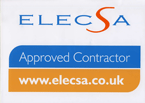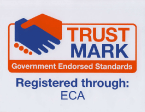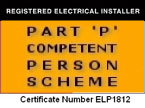Why PartP?
Part P is a new part of the Building Regulations which has been introduced by government and affects all electrical work carried out in dwellings.
People carrying out electrical work in homes and gardens in England and Wales should follow the rules set out in Part P of the Building Regulations to ensure that they are complying with the law. These rules are designed to ensure that electrical work is safe.
Part P has been introduced in order to:
- reduce the number of deaths, injuries and fires caused by faulty electrical installations
- make life harder for 'cowboys' to leave electrical installations in an unsafe condition
A 'Competent Person' is a firm that has been approved by one of the government-approved Part P schemes as sufficiently competent to self-certify that its work complies with the Building Regulations. Schemes authorised by the Department for Communities and Local Government (DCLG) are listed on its website.
A registered firm is not required to notify a building control body of its proposals to carry out electrical installation work before it begins, or to have the work inspected on completion. This reduces costs for the customer as the additional charges for calling out a building control body can be avoided.
If a firm wishes to become a Competent Person it must first be vetted to ensure it meets the conditions of registration, including the required levels of competence. The minimum standard of technical competence required is as follows:
- Electrical work in dwellings is designed, installed, inspected and tested to the standard required by BS 7671
- Applicants for a Part P Competent Person Scheme are assessed to be able to work to these standards
Case Electrical Services is Fully Qualified, and is a full member of the BRE Certification Scheme.
Certification Number ELP1247
The Requirement
The Building Regulations apply when building work is undertaken. Part P will redefine building work to include electrical work on certain types of fixed electrical installation in dwellings. The new requirement in the Building Regulations, ‘Requirement P', is simply that:
- P1 Design, Installation, Inspection and Testing
Reasonable provision shall be made in the design, installation, inspection and testing of electrical installations in order to protect persons from fire or injury. - P2 Provision Information
Sufficient information shall be provided so that persons wishing to operate, maintain or alter an electrical installation can do so with reasonable safety.
Enforcement
Failure to comply with the requirement will be a criminal offence. Local authorities will also have the power to require the removal or alteration of work that does not comply with the Building Regulations.
The Result
Householders needing electrical work must either
- employ an electrical contractor who is registered as a ‘Competent Person’ to Part P. For a full list of approved contractors
- inform the Local Authority Building Control office of their intention to carry out electrical installation works and submit building notices in advance of the works; Building Control will then carry out an inspection of the work when it is completed. LABC inspection fees will be charged;





 Part P is a new part of the Building Regulations which has been introduced by government and affects all electrical work carried out in dwellings. Any electrical work carried out in homes and gardens in England and Wales should follow the rules set out in Part P of the Building Regulations to ensure that they are complying with the law. These rules are designed to ensure that electrical work is safe.
Part P is a new part of the Building Regulations which has been introduced by government and affects all electrical work carried out in dwellings. Any electrical work carried out in homes and gardens in England and Wales should follow the rules set out in Part P of the Building Regulations to ensure that they are complying with the law. These rules are designed to ensure that electrical work is safe.